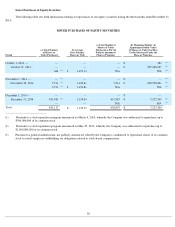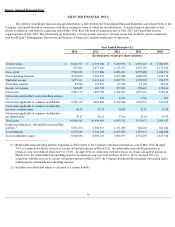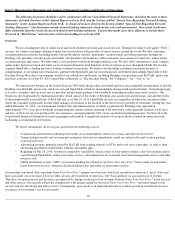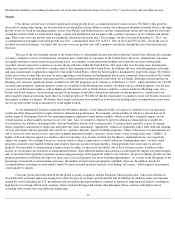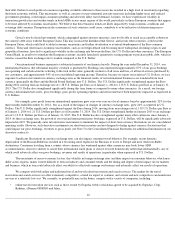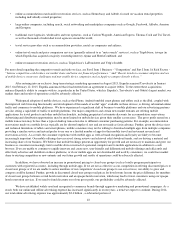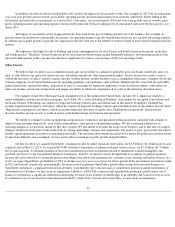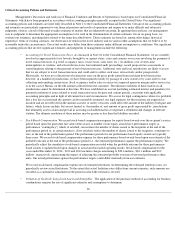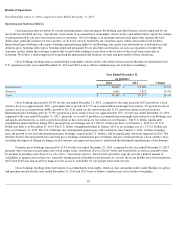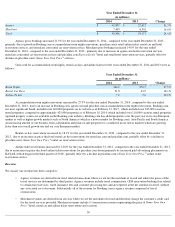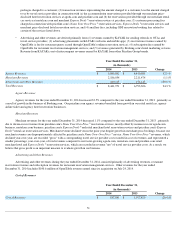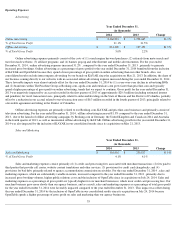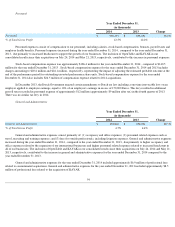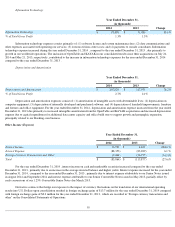Priceline 2014 Annual Report Download - page 49
Download and view the complete annual report
Please find page 49 of the 2014 Priceline annual report below. You can navigate through the pages in the report by either clicking on the pages listed below, or by using the keyword search tool below to find specific information within the annual report.
In addition, the date on which certain holidays fall can have an impact on our quarterly results. For example, in 2013 our second quarter
year
-over-year growth rates in revenue, gross profit, operating income and operating margins were adversely affected by Easter falling in the
first quarter instead of the second quarter, as it did in 2012. Conversely, our second quarter 2014 year-over-year growth rates in revenue, gross
profit, operating income and operating margins were favorably impacted by Easter falling in the second quarter instead of the first quarter, as it
did in 2013.
The impact of seasonality can be exaggerated in the short-term by the gross bookings growth rate of the business. For example, in
periods where our growth rate substantially decelerates, our operating margins typically benefit from relatively less variable advertising expense.
In addition, gross profit growth is typically less impacted in the near term due to the benefit of revenue related to reservations booked in previous
quarters.
We experience the highest levels of booking and travel consumption for our Asia-Pacific and South American businesses in the first
and fourth quarters. Therefore, if these businesses grow faster than our North American and European businesses, our operating results for the
first and fourth quarters of the year may become more significant over time as a percentage of full year operating results.
Other Factors
We believe that our future success depends in large part on our ability to continue to profitably grow our brands worldwide, and, over
time, to offer other travel and travel related services and further expand into other international markets. Factors beyond our control, such as
worldwide recession, oil prices, terrorist attacks, unusual weather patterns, natural disasters such as earthquakes, hurricanes, tsunamis, floods and
volcanic eruptions, travel related health concerns including pandemics and epidemics such as Ebola, Influenza H1N1, avian bird flu and SARS,
political instability, regional hostilities, imposition of taxes or surcharges by regulatory authorities or travel related accidents, could adversely
affect our business and results of operations and impair our ability to effectively implement all or some of the initiatives described above.
For example, in late 2012 Hurricane Sandy disrupted travel in the northeastern United States. In early 2011, Japan was struck by a
major earthquake, tsunami and nuclear emergency. In October 2011, severe flooding in Thailand, a key market for our agoda.com business and
the Asian business of Booking.com, negatively impacted booking volumes and cancellation rates in this market. In addition, Thailand has
recently experienced disruptive civil unrest, which has negatively impacted booking volumes and cancellation rates in this market. In early 2010,
Thailand also experienced civil unrest, which caused the temporary relocation of agoda.com's Thailand-based operations. Future natural
disasters, health concerns or civil or political unrest could further disrupt our business and operations.
We intend to continue to invest in marketing and promotion, technology and personnel within parameters consistent with attempts to
improve long-term operating results, even if those expenditures create pressure on operating margins. We have experienced pressure on
operating margins as we prioritize initiatives that drive growth. We also intend to broaden the scope of our business, and to that end, we explore
strategic alternatives from time to time in the form of, among other things, mergers and acquisitions. Our goal is to grow gross profit and achieve
healthy operating margins in an effort to maintain profitability. The uncertain environment described above makes the prediction of future results
of operations difficult, and accordingly, we may not be able to sustain gross profit growth and profitability.
On July 24, 2014, we acquired OpenTable, a leading provider of online restaurant reservations, for $2.5 billion ( $2.4 billion
net of cash
acquired) and on May 21, 2013, we acquired KAYAK Software Corporation, a leading travel meta-search service, for $2.1 billion ($1.9 billion
net of cash acquired). A substantial portion of the total consideration for these acquisitions related to identifiable acquired intangibles and
goodwill (see Note 9 to the Consolidated Financial Statements). In 2015, we intend to invest in OpenTable to accelerate its global expansion,
increase the value offered to its restaurant partners and enhance the end-to-
end experience for customers across desktop and mobile devices. As a
result, we expect OpenTable's profitability in 2015 to decline year-over-
year as we invest for future growth. If the investments we intend to make
in 2015 and beyond, in particular internationally, are unsuccessful in growing OpenTable's global online restaurant reservation business or
OpenTable experiences a significant reduction in revenues or profitability due to factors such as competition, increased capital expenditures or
investments in its business, we may incur an impairment. Likewise, if KAYAK is unsuccessful in profitably growing its global online travel
brand or it experiences a significant reduction in advertising revenues on its websites or mobile apps or profitability due to factors such as a loss
of continued access to travel services information provided by other OTAs or travel service providers, we may incur an impairment.
45





